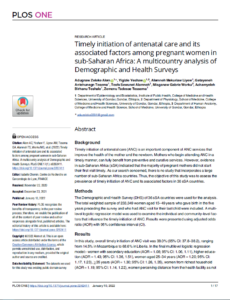
Background
Timely initiation of antenatal care (ANC) is an important component of ANC services that improve the health of the mother and the newborn. Mothers who begin attending ANC in a timely manner, can fully benefit from preventive and curative services. However, evidence in sub-Saharan Africa (sSA) indicated that the majority of pregnant mothers did not start their first visit timely. As our search concerned, there is no study that incorporates a large number of sub-Saharan Africa countries. Thus, the objective of this study was to assess the prevalence of timely initiation of ANC and its associated factors in 36 sSA countries.
Methods
The Demographic and Health Survey (DHS) of 36 sSA countries were used for the analysis. The total weighted sample of 233,349 women aged 15–49 years who gave birth in the five years preceding the survey and who had ANC visit for their last child were included. A multi-level logistic regression model was used to examine the individual and community-level factors that influence the timely initiation of ANC. Results were presented using adjusted odds ratio (AOR) with 95% confidence interval (CI).
Results
In this study, overall timely initiation of ANC visit was 38.0% (95% CI: 37.8–38.2), ranging from 14.5% in Mozambique to 68.6% in Liberia. In the final multilevel logistic regression model:- women with secondary education (AOR = 1.08; 95% CI: 1.06, 1.11), higher education (AOR = 1.43; 95% CI: 1.36, 1.51), women aged 25–34 years (AOR = 1.20; 95% CI: 1.17, 1.23), ≥35 years (AOR = 1.30; 95% CI: 1.26, 1.35), women from richest household (AOR = 1.19; 95% CI: 1.14, 1.22), women perceiving distance from the health facility as not a big problem (AOR = 1.05; 95%CI: 1.03, 1.07), women exposed to media (AOR = 1.29; 95%CI: 1.26, 1.32), women living in communities with medium percentage of literacy (AOR = 1.51; 95%CI: 1.40, 1.63), and women living in communities with high percentage of literacy (AOR = 1.56; 95%CI: 1.38, 1.76) were more likely to initiate ANC timely. However, women who wanted their pregnancy later (AOR = 0.84; 95%CI: 0.82, 0.86), wanted no more pregnancy (AOR = 0.80; 95%CI: 0.77, 0.83), and women residing in the rural area (AOR = 0.90; 95%CI: 0.87, 0.92) were less likely to initiate ANC timely.
Conclusion
Even though the WHO recommends all women initiate ANC within 12 weeks of gestation, sSA recorded a low overall prevalence of timely initiation of ANC. Maternal education, pregnancy intention, residence, age, wealth status, media exposure, distance from health facility, and community-level literacy were significantly associated with timely initiation of ANC. Therefore, intervention efforts should focus on the identified factors in order to improve timely initiation of ANC in sSA. This can be done through the providing information and education to the community on the timing and importance of attending antenatal care and family planning to prevent unwanted pregnancy, especially in rural settings.